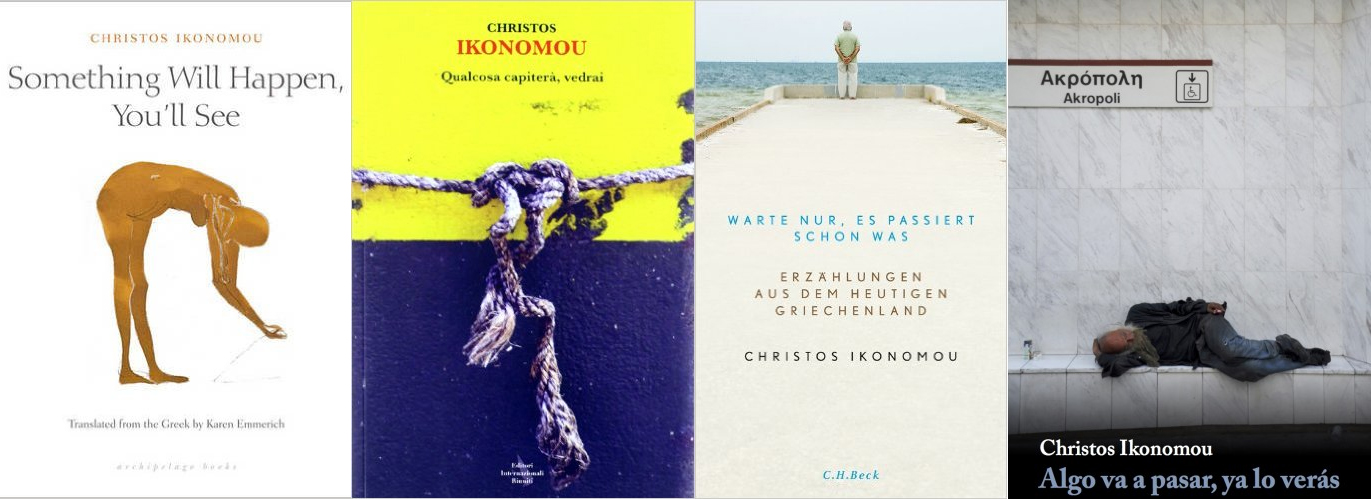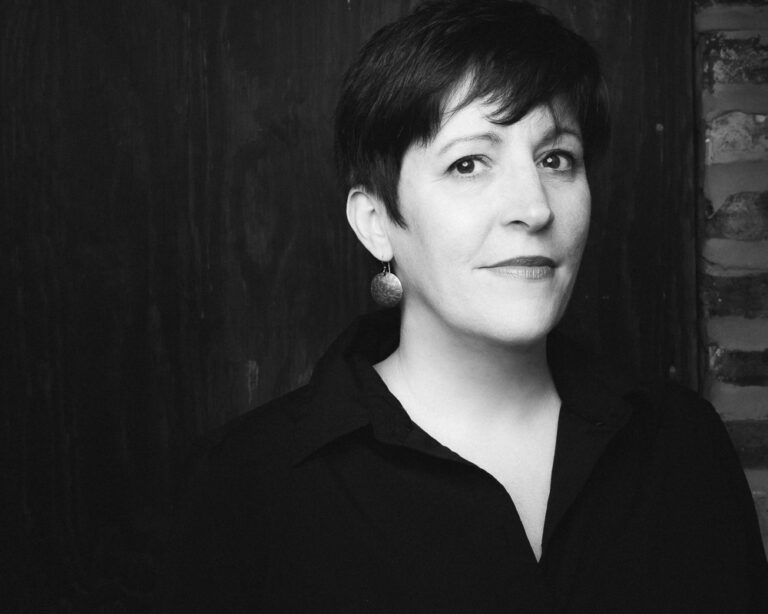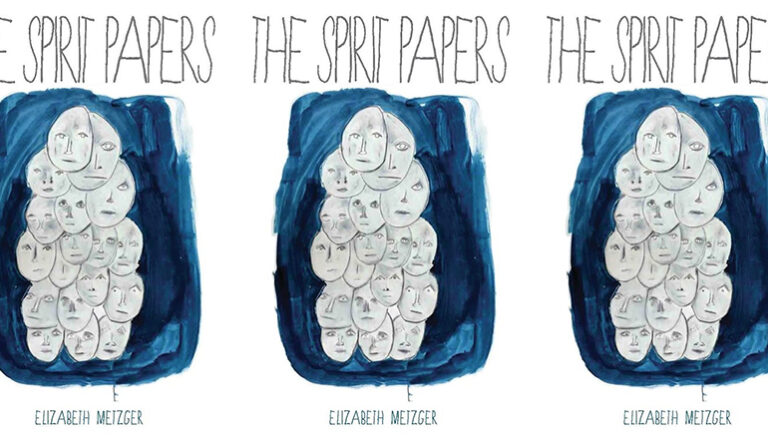“I know that reality and truth are not always the same thing”: An Interview with Christos Ikonomou

Christos Ikonomou is the author of three short story collections, including Something Will Happen, You’ll See (Archipelago Books, trans. Karen Emmerich, 2016), for which he won the National Short Story Prize. Something Will Happen, You’ll See, a devastating and sparingly written collection of stories about the Greek crisis in working class neighborhoods in Athens, is his first book to appear in English. Ikonomou was born in and is based in Athens, and has just returned from a two week tour in the US with Archipelago Books.
Maria Eliades: Your writing is very sparse. Does the writing start out that way or do you pare it down? I read in one interview, for instance, that you rewrote “Mao” 30 times.
Christos Ikonomou: Yes, I’m doing writing all the time. I don’t write. I rewrite. But yes, most of the times, the first drafts are a little bit larger, bigger, wider, and then I’m starting to trim them down. I’m writing painfully, slowly, so I need a lot of time to get where I think I want the writing. It’s a very slow process for me. I’m writing very slowly.
Most of the stories’ first drafts were somewhat more expanded, and then as I’ve said, I don’t like using many words. I’m trying to be as brief as I can be in order to convey the spirit of the story so to say.
ME: Can you tell me about the neighborhoods in which the stories are set?
CI: Most of them are working class neighborhoods that are around or near the port of Piraeus and I’ve lived there for about 30 years, so I know the place and I know the people. When I started to write the short stories, I didn’t have it in mind to set them all in the same neighborhoods, but after I’d written the third or fourth story, I realized that they were all set in the same place, so it was kind of an experiment to me to see if I could make this geographical connection. I was always thinking that a short story collection has to be a collection, some kind of a connection among the stories.
ME: When you published the collection it was at the beginning of the Greek crisis, so I’m sure these neighborhoods have suffered far worse in the meantime. How does the collection look at this point in retrospect? It’s six years after it was published in Greek, it’s seven years since the crisis started.
CI: The Greek edition of the book came out in March 2010. I started to write the stories maybe in late 2003 or early 2004, so it’s almost 12 years and when I started to write the book, there was no crisis in the horizon. It was a different era. There was this sense of prosperity in Greece. We were preparing for the Olympic Games in Athens, but I had the sense that something was not right. Underneath this atmosphere of prosperity and national excitement I sensed there was something else. So what I tried to go a little bit deeper to the darker corners of this country, because some of the circumstances that lead up to the crisis were evident in those neighborhoods long before.
Unfortunately when the book came out in 2010, some of the Greek readers thought that it was some kind of prophetic book in the sense that the stories were written long before. Of course I’m not a prophet. What I’m trying to do is to keep my eyes and ears open to what’s happening around me. Now that I’m thinking again about the whole process that lead to writing this book, I can say that this is not actually a book just about the Greek crisis. Every time I’m writing something, my main concern is to overcome the walls of my language, my nationality, my culture, to reach out to people—Europeans, Americans, whomever. I’m always trying to do something that has a wider or broader perspective.
ME: The stories you’ve written are very devastating. I’m sure a lot of people have found themselves depressed reading them, but I don’t come away feeling depressed at the end. There’s something beautiful about them, but what do you think it is about literature that has the power to take truly depressing circumstances and yet make them seem beautiful or manageable in a way that real life doesn’t do?
CI: I’m not sure. I have a great difficulty to talk about what I’m writing because I have a rather mystical approach to literature. It’s very hard for me to rationalize what I’m doing. When I’m writing, I’m in a state of trance, of ecstasy. I’m not sitting down making a plan: “Now I’m sitting down to write a story of hope and despair. Now I’m sitting down to write a story of poverty.” I don’t do that. That’s for me something that I don’t like and I don’t want to do. The thing is every time that I’m starting to write a story, that’s why it takes me a long time to start and write. I have these voices in my head and I need time to understand who is this voice, and what is it trying to tell me. That’s the way I’m working when I write. I have these voices in my head, I need time to listen to them very carefully, and then I start to write. Again, it’s very difficult to me afterwards to try to consider what the story is really about. The reason for this is because I don’t want to send any messages. I’m not interested in that. I write these stories because I have to write them and I have to do justice to the voices I’m listening to in my head.
The main thing is that, and now I’m speaking as a reader of literature, reading and writing for me is a kind of a trial, is a kind of suffering. It’s like the Crucifixion before the Resurrection. In order to reach the Resurrection, you have to go through the Crucifixion, and that’s why since I started reading literature in my early teens, I was attracted to the sense of suffering and injustice. I’m always thinking that—and I don’t want to rationalize the whole process—but in the end, after all, it seems brighter when it is dark all around. I think that by reading stories or by writing stories that have much dark in them within them, the sense of hope emerges in a more substantial way. That’s what I’m trying to do. Maybe I have heard by some readers telling me that these are bleak stories, depressing stories, dark stories. These are the type of stories I like and am trying to write.
I think that there is some kind of hope in them. That’s the ultimate creation of the writer. You have, or at least, I have, to create hope by my writing. Hope as I see it is probably the most powerful weapon we have against the fear of death. It’s what keeps us alive. I’m trying to create hope and at the same time to find hope in all these difficult situations that my characters are going through, but in order to do that—and that’s one of the other reasons that it takes too much time to write my stories—is that I have to believe. I have to believe that the stories I write are true. I don’t care if they are real, but I have to believe that they’re true. I know that reality and truth are not always the same thing. I’m not interested in reality, but I have a great interest in truth. I have to believe that the story I write every time is true, and I have to believe in what my characters say, what they do, what they feel. That takes a lot of time. To me they are strangers. Maybe they’re human beings that are born out of my imagination, but I have to get to know them and I have to believe them.


